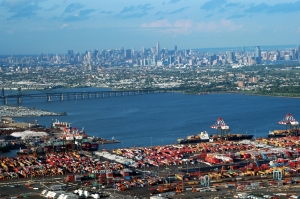


(Posted on 04/10/24)
Strike action at ports on the US East and Gulf Coast have ended after a new wage agreement was reached, but a backlog of more than 40 ships waiting to offload billions of dollars of cargo means the pain is not yet over.
The International Longshoremen’s Association and the United States Maritime Alliance reached a tentative agreement on wages while also extending the Master Contract until 15 January 2025 to allow further negotiations, in particular around automation at ports.
The strike lasted three days and at 5am (Eastern Time) today, Friday, there were 44 ships queuing to enter affected ports (source: Xeneta and Kuehne+Nagel) and more than 120 en route (source: Xeneta and Marine Benchmark).
Peter Sand, Xeneta Chief Analyst, said: “A prolonged crisis on this scale would have been toxic for global supply chains so the market is breathing a sigh of relief.
“Closing all ports on the US East Coast and Gulf Coast – even for just three days – comes with severe consequences. We must now wait to see how quickly the returning workers are able and willing to deal with the huge backlog of ships waiting to offload thousands of containers carrying billions of dollars of goods.”
Sand believes the ripple effect of the strike will spread across global supply chains in the weeks to come.
He said: “The dozens of ships delayed on the US East Coast and Gulf Coast will also be late arriving back in the Far East. This will impact schedules towards the end of this year and possibly into 2025 in the run-up to Lunar New Year at the end of January, which traditionally sees an increase in goods shipped out of the Far East.”
Latest data from Xeneta – based on more than 450 million crowd-sourced data points – shows shippers have already been hit by increasing freight rates as a direct result of strikes.
Sand has warned the market will remain challenging in the weeks and months ahead.
He said: “There has already been a financial impact for shippers through increasing freight rates on Transatlantic trades at a time when markets on other major trades out of the Far East remain elevated due to conflict in the Red Sea.
“It is good news the strike has ended but shippers are not out of the woods just yet. It is only a tentative agreement and automation at ports will remain a major stumbling block.
“Automation is an issue the two sides have been unable to resolve in over a year of negotiations – now they have just 100 days to reach an agreement otherwise we could see further strike action.”
With this year’s Rail Conference “Rail Freight Transport and Seaports”, a joint initiative... Read more
Asian Bulk Logistics (ABL Group) and ICG have jointly announced the successful completion of ABL&rsquo... Read more
Abu Dhabi based AD Ports Group, a leading global enabler of integrated trade, industry and logistics... Read more
The Executive Board of Hamburger Hafen und Logistik AG (HHLA) has appointed Patrick Krawutschke as Managing... Read more
Abu Dhabi based AD Ports Group, a global enabler of integrated trade, transport, industry, and logistics... Read more
This year marks a significant milestone in maritime innovation as Port Hedland, Australia, celebrates... Read more
Associated British Ports (ABP), the UK’s leading port operator, has announced the latest tranche... Read more
During the Investment, Labour, and Trade Promotion Programme in Japan (November 16–22, 2025),... Read more
AD Ports Group subsidiary Khalifa Economic Zones Abu Dhabi - KEZAD Group, the largest operator of integrated... Read more
Abu Dhabi based AD Ports Group, a global enabler of integrated trade, transport, industry, and logistics... Read more